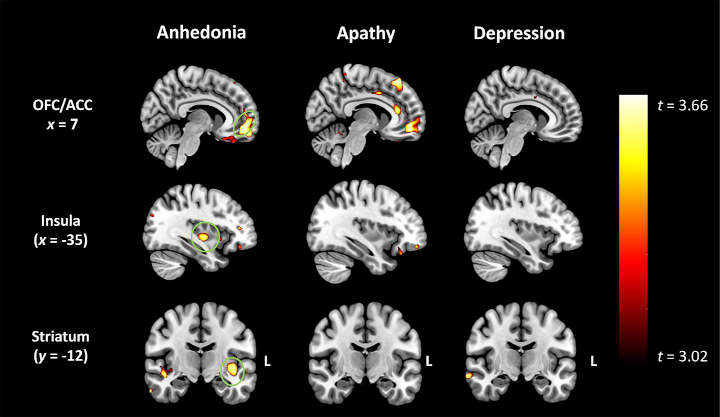People with early-onset dementia are often misdiagnosed as having depression. Research has now identified what may actually be happening in such cases: a profound loss of ability to experience pleasure.
The loss is related to degeneration of ‘hedonic hotspots’ in the brain where pleasure mechanisms are concentrated, University of Sydney-led research1 shows. The study revealed marked degeneration, or atrophy, of grey matter in frontal and striatal areas of the brain related to diminished reward-seeking, in patients with frontotemporal dementia (FTD).
The researchers say it is the first study to demonstrate profound anhedonia – the clinical definition for a loss of ability to experience pleasure – in people with FTD.
Dramatic Decline
Anhedonia is also common in people with depression, bipolar disorder and obsessive-compulsive disorder and can be particularly disabling for the individual.
In the study, patients with FTD – which generally affects people aged 40-65 – displayed a dramatic decline from pre-disease onset, in contrast to patients with Alzheimer’s disease, who were not found to show clinically significant anhedonia.
Much of human experience is motivated by the drive to experience pleasure but we often take this capacity for granted. But consider what it might be like to lose the capacity to enjoy the simple pleasures of life – this has stark implications for the wellbeing of people affected by these neurodegenerative disorders,
said senior author Professor Muireann Irish from the University of Sydney.
172 participants were took part in the study, including 87 FTD, and 34 Alzheimer’s disease participants.
Primary Presenting Feature
The study suggests the importance of considering anhedonia as a primary presenting feature of frontotemporal dementia, where researchers found neural drivers in areas that are distinct from apathy or depression.
Our findings also reflect the workings of a complex network of regions in the brain, signaling potential treatments,"
said Professor Irish, who also recently published a paper2 in Brain about moral reasoning in FTD.
Future studies will be essential to address the impact of anhedonia on everyday activities, and to inform the development of targeted interventions to improve quality of life in patients and their families,
she added.
-
Siobhán R Shaw, Hashim El-Omar, Daniel Roquet, John R Hodges, Olivier Piguet, Rebekah M Ahmed, Alexis E Whitton, Muireann Irish, Uncovering the prevalence and neural substrates of anhedonia in frontotemporal dementia, Brain, 2021;, awab032 ↩︎
-
Cherie Strikwerda-Brown, Siddharth Ramanan, Zoë-Lee Goldberg, Annu Mothakunnel, John R Hodges, Rebekah M Ahmed, Olivier Piguet, Muireann Irish, The interplay of emotional and social conceptual processes during moral reasoning in frontotemporal dementia, Brain, Volume 144, Issue 3, March 2021, Pages 938–952 ↩︎
